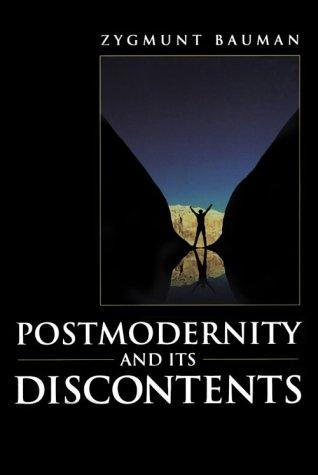In the postmodern world of freely competing styles and life patterns there is still one stern test of purity which whoever applies for admission is required to pass: one needs to be capable of being seduced by the infinite possibility and constant renewal promoted by the consumer market, of rejoicing in the chance of putting on and taking off identities, of spending one’s life in the never ending chase after ever more intense sensations and even more exhilarating experience. Not everybody can pass that test. Those who do not are the ‘dirt’ of postmodern purity. Since the criterion of purity is the ability to partake in the consumerist game, those left outside as a ‘problem’, as the ‘dirt’ which needs to be ‘disposed of’, are flawed consumers – people unable to respond to the enticements of the consumer market because they lack the required resources, people unable to be ‘free individuals’ according to the sense of ‘freedom’ as defined in terms of consumer choice. They are the new ‘impure’, who do not fit into the new scheme of purity. Looked at from the now dominant perspective of the consumer market, they are redundant – truly ‘objects out of place’. The job of separating and eliminating that waste of consumerism is, like everything else in the postmodern world, deregulated and privatized. The shopping malls and supermarkets, the temples of the new consumerist creed and the stadiums where the game of consumerism is played, bar entry to the flawed consumers at their ownexpense, surrounding themselves with surveillance cameras, electronic alarms and heavily armed guards; so do the neighbourhoods where lucky and happy consumers live and enjoy their new freedoms; so do the individual consumers, viewing their homes and their cars as ramparts of permanently besieged fortresses. These deregulated, privatized, diffuse concerns with guarding the purity of consumerist life also come together in two contradictory, yet mutually reinforcing political demands directed towards the state. One is the demand to further enhance consumer freedoms of free consumers: to privatize the use of resources by ‘rolling back’ all collective intervention in private affairs, dismantling politically imposed constraints, cutting taxes and public expenditure. Another demand is to deal more energetically with the consequences of the first demand: surfacing in the public discourse under the name of ‘law andorder’, this second demand is about the prevention of the equally deregulated and privatized protest of the victims of deregulation and privatization. Those whom the expansion of consumer freedom deprived of consumer skills and powers need to be checked and kept at bay; being a drain on public funds, and therefore indirectly on ‘taxpayers’ money’ and the freedom of free consumers, they need to be checked and kept at bay at the least possible cost. If waste-disposal proves to be less costly than waste-recycling, it should be given priority; if it is cheaper to exclude and incarcerate the flawed consumers to keep them from mischief, this is preferable to the restoration of their consumer status through thoughtful employment policy coupled with ramified welfare provisions. And even the ways of exclusion and incarceration need to be ‘rationalized’, preferably subjected to the severe discipline of market competition: let the cheapest offer win …

